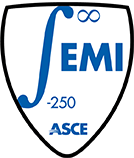Sensing Skin for Condition Assessment
Iowa State University
Problems
Structural diagnostic and prognostic at the mesoscale is a difficult task, currently impeded by the lack of applicable sensing technologies. Most of existing sensing solutions cannot be scaled up without necessitating substantial costs and complex signal processing algorithms. It results that monitoring and diagnostic solutions may rapidly become financially unattractive because of their low return on investment. Cost-effective sensing techniques that can easily be deployed at the macro/mesoscale, capable of providing direct structural diagnostic and prognostic for condition assessment, need to be developed.
Approach
Conducting polymers have opened possibilities to develop inexpensive flexible sensors that could be deployed at large scale for monitoring mesosurfaces. A soft elastomeric capacitor (SEC) has been developed by the research group, which constitutes a large flexible strain gauge. Deformations in the sensor are transduced into changes in capacitance, which can be directly measured by a data acquisition system. The SEC is inexpensive to fabricate, uses low power to operate, can be customized in shapes and sizes, and is highly robust against mechanical tampering. The SEC can be deployed in a network configuration to cover very large surfaces. Analogous to biological skin, the sensing system can detect local deformations over a global area. Using the technology, signal features can be extracted from these two-dimensional strain maps. Temporal and spatial correlation of these features can enable damage diagnosis and localization. Signal features can also be integrated into prognosis models to conduct condition assessment.
Findings
Research results have demonstrated that the SEC compares well against off-the-shelf strain gauges, and can be used to capture vibration signatures along multiple axes due to the bi-directional measurement capability of the sensor. The group has also demonstrated that the technology can be used in a network configuration to extract deflection shapes, and may perform better than off-the-shelf strain gauges due to the averaging property of the sensor which minimizes the effects of sensor placement errors. Specific applications of this sensing skin are being studied, which include condition assessment of wind turbine blades, distributed weigh-in-motion sensing, and detection and localization of fatigue cracks.
Impact
Results have shown that it is possible to conduct condition assessment of mesosystems using this inexpensive sensing skin. Potential impacts include: 1) condition-based maintenance of civil structures (e.g., bridges and wind turbine blades), which would result in significantly improving on life-cycle costs by optimizing maintenance and inspection schedules, and structural resiliency by forecasting structural behavior (prognosis); 2) adaptability of operations (e.g., traffic management and wind turbine controllers), to enhance safety and system optimality; and 3) data for research & development (e.g., structural usage and responses), which could for be used for modifying design codes and reducing conservatism in design.
Core competencies
- Sensor development for structural health monitoring
- Nanocomposites and multifunctional materials
- Feature extraction from dense arrays of sensors
- Data fusion for condition assessment
- Reliability of mesosystems
Current research team members
- Simon Laflamme - Assistant Professor, Lead
- Randall L. Geiger - Professor
- Nicola Bowler - Professor
- Michael Kessler - Professor
- Krishna Rajan - Professor
- Partha Sarkar - Professor
- Umesh Vaidya - Associate Professor
- Daji Qiao - Associate Professor
- Brent Phares - Associate Direction, Institute for Transportation
- Hussam Saleem - Ph.D Candidate
- Justin Dahlberg - Ph.D Candidate
- Huanhuan Zhang - Ph.D Candidate
- Venkatesh Chinde - Ph.D Candidate
- Heather Sauder - Ph.D Candidate
- Weixing Sun - M.Sc Candidate
- Sari Kharroub - M.Sc Candidate
- Chunhui Song - M.Sc Candidate
- Jingzhe Wu - M.Sc Candidate
- Austin Downey - Undergraduate Student
- Wei Zeng - Undergraduate Student
Research sponsors
- Iowa Alliance for Wind Innovation and Novel Development (IAWIND)
- Iowa Energy Alliance (IEC)
- U.S. Department of Agriculture (USDA)
- American Society for Nondestructive Evaluation (ASNT)
- Iowa Department of Transportation (IaDOT)
Current research collaboration
- Comparison of Multi-Functional Materials for Dynamic-Based Monitoring (Filippo Ubertini, University of Perugia).


